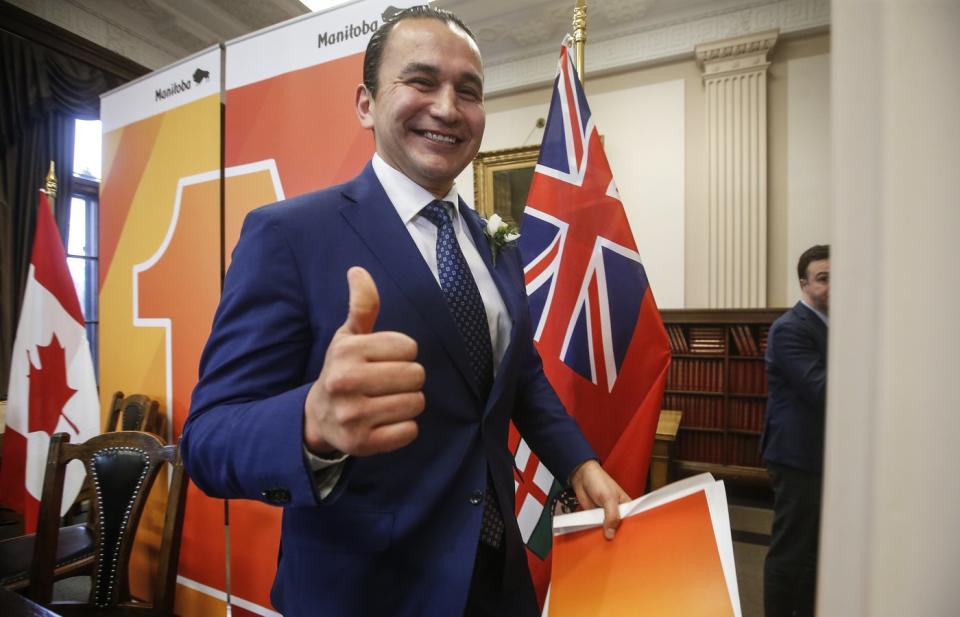Manitoba premier polling high after nine months, but experts say challenges lie ahead

WINNIPEG — Nine months after being elected, Manitoba Premier Wab Kinew continues to enjoy a honeymoon with voters.
His NDP government has enacted many promises the party made during last year's election campaign, and opposition parties are working to rebuild after losing leaders and legislature seats.
But challenges lie ahead, experts say, as the government tries to enact other pledges — such as keeping grocery prices affordable — and follow through on a fiscal plan that could require tight restraint.
"The government has been working to fulfil commitments it made during the election, (but) I would say affordability is something that in many ways is beyond the control of the provincial government," said Christopher Adams, adjunct professor of political studies at the University of Manitoba.
Recent opinion polls suggest NDP support has grown since the party took 34 of the 57 legislature seats in the Oct. 3 election.
The party also added a seat last month when it won a byelection in the Tuxedo constituency — a high-income part of Winnipeg that had been a Progressive Conservative stronghold since its creation in 1979.
Kinew followed through on a promise to support a landfill search for the remains of two slain First Nations women. He also temporarily suspended the provincial fuel tax and boosted funding for school nutrition programs.
But other campaign promises are less certain, including a one-year freeze on hydroelectric rates that has been pushed back and with no firm start time.
A promise to keep grocery prices down has also raised questions.
In December, Kinew threatened action against grocery outlets if they did not pass along savings from his suspension of the fuel tax. Recent data from Statistics Canada says that not only are food prices continuing to rise, the inflation rate for food purchased in stores in Manitoba is running higher than the national average.
The Opposition Progressive Conservatives have accused the government of breaking their promise and having no real plan to keep food prices down.
Finance Minister Adrien Sala said the government is satisfied that grocery inflation in Manitoba, measured in the months since January, has been running lower than the other Western provinces.
"We're just watching this very carefully and, of course, we're seeing our action having the positive impact we hoped it would," Sala said.
The Retail Council of Canada has said fuel prices have a minimal impact on grocery costs.
Paul Thomas, professor emeritus of political studies at the University of Manitoba, said a province's ability to control prices, aside from direct tax cuts such as the fuel levy, is limited.
"Symbolic statements and actions can earn the government some temporary reprieve from public frustration (and) anger, but that will not endure if inflation persists," he said.
Another challenge facing the government is its recently announced overhaul of education taxes on property.
A new credit system, to take effect next year, is to reap an estimated $148 million more from property owners. Owners of lower-value homes are to pay less, but many of those with middle- and high-value homes will pay more. Owners of commercial and residential rental properties would also pay more.
"You wonder if maybe that byelection in Tuxedo might have worked out a little bit differently if that byelection were held 18 months from now," Adams said.
The government's promise to balance the budget before the next election in 2027 may prove to be a challenge as well.
Manitoba has run deficits in every year but two since 2009, and the NDP's plan to return to balance requires annual spending growth below 2.5 per cent. The NDP criticized spending restraint under the former Progressive Conservative government as "austerity" and promised to pump money into health care and front-line services, with raises for public-sector workers.
Health care will also be a key factor in deciding whether public support for the NDP will continue, Adams said. The government has moved to fund more health-care workers and has plans to expand emergency services, but time will tell if patients will see a difference, he said.
"You go to the Health Sciences Centre's emergency wards, you're still waiting many, many hours to be seen. So the corrections of the health care system — that's a long game."
This report by The Canadian Press was first published July 2, 2024.
Steve Lambert, The Canadian Press

 Yahoo Finance
Yahoo Finance 